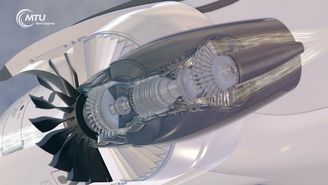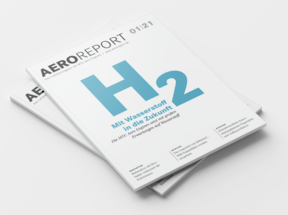
Press archive detail
ILA 2012: MTU Aero Engines on track to achieve its six-billion euro goal in 2020
- Engine portfolio for a successful future: markedly growing commercial business – stable military business
- Stakes in next-generation engines
Berlin, September 11, 2012 – At its press conference at the ILA Air Show in Berlin on Tuesday, September 11, MTU Aero Engines presented itself as a company geared up for the future, its business activities encompassing a balanced mix of commercial and military engine programs and maintenance, repair and overhaul (MRO) services. The company’s focus is clear: “By the year 2020, we want to achieve our goal of six billion euros in revenues,” emphasized MTU CEO Egon Behle.
Behle took a positive view of the market environment, pointing out that global passenger air traffic is growing at a steady rate, and so is demand for new aircraft. As things stand, the number of air passengers carried will increase 40 percent from today’s levels by 2020. MTU Aero Engines has been quick to respond to the emerging trend and has taken stakes in the commercial engine programs of the future: the V2500 for the A320 family, the GEnx for the Boeing 787 Dreamliner and the Boeing 747-8, and Pratt & Whitney’s geared turbofan (GTF) family of engines. The GTF has found homes on the A320neo, Bombardier’s new CSeries, Mitsubishi’s MRJ, and Irkut’s MS-21.
For Behle, the company’s enhanced role in the International Aero Engines (IAE) consortium for the V2500 is a crucial milestone for Germany’s leading engine manufacturer: MTU increased its share in the program from 11 to 16 percent this year, a move to generate additional revenues worth three to four billion euros over the next 25 years. Moreover, the IAE partners have agreed to set up a joint venture to build propulsion systems for next-generation aircraft. A technology leader in major engine areas, MTU is capitalizing on its competitive edge, securing market shares in future-generation engines for both narrowbody and widebody aircraft long-term. “Innovation is and remains our company’s driving force and one of MTU’s strategic pillars,” explained Behle. “We aim to further strengthen our position as a technology leader over the next few years and acquire new program stakes. Our core competencies are in the areas of low-pressure turbines, high-pressure compressors, high-tech manufacturing techniques, and maintenance, repair and overhaul, and we want keep developing our capabilities in these fields.”
Technology leader
MTU impressively demonstrated its innovative power when it took a stake in Pratt & Whitney’s GTF. Behle: “One thing is clear: When it comes to commercial engines, we’ll continue to focus on this propulsion system in the future.” This innovative engine concept is setting new standards in environmentally friendly technologies. Compared with today’s conventional turbofans, the GTF cuts fuel burn by 15 percent and noise emissions by about 20 dB, which is tantamount to a 50-percent reduction in perceived noise levels. The tremendous market success of the A320neo medium-haul aircraft goes to show that at the moment, it is the engine industry that is the pacemaker in the development of green aviation technologies. MTU contributes the high-speed low-pressure turbine to the GTF, a key component absolutely essential for building GTFs. Said Behle: “We are the only manufacturer in the world capable of offering this technology.” Also, jointly with its U.S. partner, MTU develops and builds the high-pressure compressor. The German engine experts are already working to optimize the GTF to improve fuel burn and cut emissions even further: The aim is to reduce fuel consumption, and hence carbon dioxide emissions, by fully 30 percent by 2035.
Successful maintenance
MTU Maintenance, MTU’s maintenance, repair and overhaul arm, is also enjoying success, according to Behle. The workload at the worldwide shops is high, and the portfolio and customer base continue to grow. The latest addition to the maintenance portfolio is the GE90, the largest engine in the world, which powers the Boeing 777. MTU sees more potential for growth in the commercial MRO market ahead. Said Behle: “We want to broaden our global industry footprint and moreover offer customers competitive on-site services.” MTU entered the on-site business segment by acquiring a majority stake in Retan Aerospace. The U.S. company, which has since been renamed MTU Maintenance Dallas, is set to move this business forward in the next few years.
Behle described MTU’s military business as stable despite decreasing defense budgets. The EJ200 powering the Eurofighter Typhoon and the TP400-D6 powering the A400M military transport aircraft will remain important engines in MTU’s portfolio in the next decades and generate sales in production and repair. In Behle’s opinion, both aircraft have excellent export prospects also outside Europe. MTU continues to have its sight set primarily on the U.S. military market, the largest in the world. The German engine maker has already secured stakes in GE’s F404, F414, F110, and GE38 programs. With the GE38 helicopter engine, MTU, in a first for the company, not only has a production share, but also assumes development responsibility. Should plans for a GE38-powered future European heavy transport helicopter go forward, the German engine company has already secured licenses for final assembly, maintenance and testing.
About MTU Aero Engines
MTU Aero Engines, Germany’s leading engine manufacturer and the country’s only independent engine builder, is a global player in the industry. It designs, develops, manufactures, markets and supports commercial and military aircraft engines and industrial gas turbines. A technology leader, the company excels in low-pressure turbines and high-pressure compressors, as well as in manufacturing and repair techniques. MTU Maintenance is the world's largest independent provider of commercial engine maintenance, repair and overhaul services. In the military arena, MTU Aero Engines is Germany's industrial lead company for practically all engines flown by the country's armed forces. MTU has its headquarters in Munich and operates company locations around the globe. In fiscal 2011, it had a workforce of 8,200 employees and posted consolidated sales of 2.9 billion euros.



